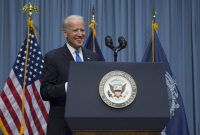Support strong Canadian climate journalism for 2025
Before her jewelry venture blossomed into an Indigenous business consultation company, Ashley Clark was about to launch a line of sterling silver pieces.
Then she saw an advertisement for a photography workshop at the ADAAWE Indigenous Business Hub in Ottawa. At the facility, she used a light box to take professional photos of her jewelry. She discovered mentors, professional development workshops and the resources she needed to improve her product photography.
Clark, who is from the Wahta Mohawks, is one of about 230 members of the business hub. Taking up the first floor of a heritage house in downtown Ottawa, the hub now offers entrepreneurs co-working space, opportunities for personal development and a place to build networks.
First Nations, Inuit and Métis people still face systemic barriers to entrepreneurship after years of colonial policies that limited access to land, capital and resources.
“I'm obsessed with it,” Clark said. “[The centre] completely breaks down so many barriers — not only the ones that entrepreneurs face but the problems that are compounded upon Indigenous entrepreneurs.”
The hub was launched in October 2022 by the National Aboriginal Capital Corporations Association (NACCA), a group that advocates for Indigenous financial institutions. Magnolia Perron, NACCA youth and women program officer, said the organization turned the ground floor of its building into the business hub near the end of the COVID-19 pandemic.
“In Ottawa, in the National Capital Region, there really wasn't a space for Indigenous businesses to come together,” Perron said. “We recognized that there was a gap in the area in terms of programs and services for Indigenous entrepreneurs.”
Since opening, the hub has offered free workshops on pricing goods and services, filing taxes as a business owner and bookkeeping. It hosts monthly social gatherings. In addition to a place to work, the facility is home to a podcast production studio, a green screen and a light box. Members can access technology, like iPads and a high-resolution camera, and media production software — all for free.
The centre also creates opportunities for mentorship. Claudette Commanda, an elder from Kitigan Zibi Anishinabeg First Nation, serves as the elder-in-residence. Entrepreneur Sunshine Tenasco is the entrepreneur-in-residence and Karla Briones is its expert-in-residence. All three offer guidance to members.
“It's not just like [a] team of experts, but a team of the community coming together to bring all the expertise, mentorship and knowledge to support the Indigenous business community,” said Zachary Pashe, hub co-ordinator.
Clark said the centre is a great place to meet other Indigenous business owners. Members include Trisha Pitura, co-founder of blanket company Mini Tipi, and Tyson Wesley, co-owner of canned water company FN Clean Water.
“[The hub] allows opportunities for smaller companies to interact with bigger companies, and we all have that shared experience of Indigenous entrepreneurship and business building,” Clark said. “It makes the community stronger. It's like learning from your elders.”
Now, Clark heads there a couple times each month to co-work, photograph her products and hold meetings.
Her jewelry business, Bougie Birch, now offers workshops and Indigenous business consultation services and is about to launch a new line of jewelry in collaboration with an artist she met through the ADAAWE hub. Clark has also started a second business that connects Indigenous vendors to brick-and-mortar stores.
“Being able to have these resources has completely accelerated my business development. I’m so lucky. It’s a good day to be Indigenous,” she said. “This is what reconciliation is — getting Indigenous business to this ideal place of where we should be.”
Isaac Phan Nay / Canada’s National Observer / Local Journalism Initiative






Comments